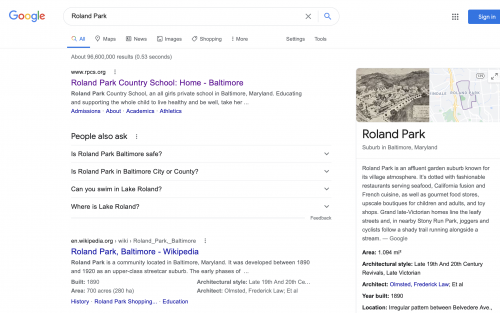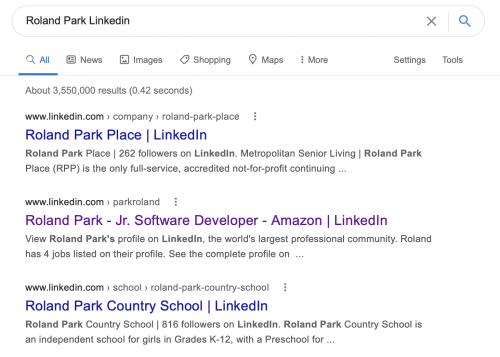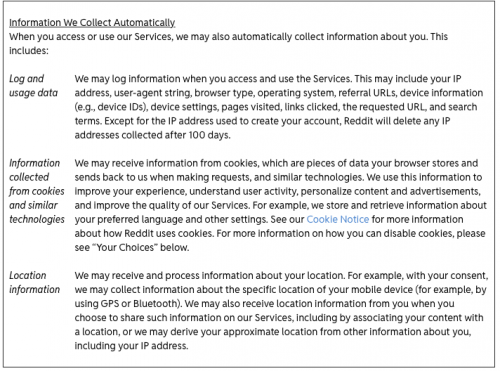Roland Park
Contents
Introduction
As a child who grew up fascinated by video games and technology, I’ve been surfing the web for longer than I can remember. Seven year old me loved typing random search queries into Google and seeing the plethora of websites that became accessible at my fingertips. I loved reading the news, playing games online, and looking up anything my heart desired. Unfortunately, after I managed to get a virus onto my family’s home computer my parents became much more strict in monitoring what I was doing on the internet. My father at the time was a phD candidate at Michigan studying online privacy (a relatively new subject back then) and gave me a stern and overly detailed talk about minimizing my digital footprint. For too long of a long time, I’ve always thought my dad was over-exaggerating his concerns of an internet that tracked every click you made. I thought to myself that having my information on the internet was harmless and nobody would find looking at my hours on Club Penguin of any use. Nevertheless, I stayed mindful of my dad’s concerns and still made a decent effort to keep my identity minimal on the internet.
In general I do believe that I spend a great amount of time on the internet. As a computer science major I naturally find myself in front of a computer more than the average person. Anyone that were to look through a log of my internet history would find a large amount of my time watching sports media and finishing my homework assignments. My fascination with the digital world along with my lack of social media interaction makes me very curious to see what the internet thinks it knows about me. Some part of me expects to see some of my interests and personality online given how many hours I am on the internet. I believe that I do a good job of keeping my online activity private but reading about cookies and the many innovative means that companies have put in place to track my online activity, I expect to find a picture of myself on the internet that depicts more than I intended people to see.
Google Searches
My Name
I thought that the best way to explore my digital identity would be through firstly exploring a couple basic search queries. I began by simply searching my first and last name – “Roland Park”. I originally believed that my first and last name would be unique enough to get some relevant hits, but my query instead returned many pages referring to an affluent Baltimore, Maryland suburb with numerous highly rated public and private K-12 schools. Several scrolls later and I still failed to find any references to any of my internet activity. I realized that I might need to be more specific with my searching.
My Location
First I started with my name and my hometown Fairfax, Virginia. I was very involved in my high school's extracurriculars and sports so I somewhat expected the addition of my hometown would help my search results. Again no luck as apparently there exists a “Roland Park” street in both Norfolk and Gainesville Virginia. My name was clearly only associated to locations so I began searching through the social media platforms I used.
Social Media and my First Result
I searched my name with all the social media platforms I used. Instagram, Facebook, YouTube, and Twitter all returned irrelevant results, most of which referred to again to physical “Roland Park” locations. My first hit came from when I searched my name with LinkedIn. I was a bit surprised that LinkedIn was the first relevant result as I most definitely use LinkedIn the least out of all my online accounts. Looking through my LinkedIn, my profile had no restrictions at all. My profile included an overall mix of my professional interests, educational history, and extracurricular activities.
Anyone that could look at my profile knew where I studied, where I worked, and all the connections that I had made on the platform. Seeing my profile surprised myself, when put in the mindset of finding information about myself I realized how public a large part of my life was on social media. It seemed obvious after the fact, yet I came to a quick realization that one's professional aspirations and history is very tied to their real world identity. Knowing how one's career interests, their likes and comments, and the connections they have paint a large picture on their personal opinions and the communities that they are in. A quick glance at my LinkedIn profile can tell anyone that I am extremely interested in the future of technology and that I have close ties with people from my high school and people who study similar majors with me at the University of Michigan. Going even further, one can make many likely assumptions from these interactions. For example, an asian male from a diverse high school who studies computer science at the University of Michigan can often times be assumed to be somewhat liberal and has values rooted in education and diversity. Many conclusions could be made based on one's LinkedIn and deep diving into my account highlighted how easy it is to tie an online identity to an account that serves a completely different purpose.
A Relatively Private Footprint
Unlike my LinkedIn, most of my social media account and digital interactions have remained private towards the every day random stranger on the internet. I have developed a habit of making all my social media accounts private in constant fear of my father’s comments on how “nothing is completely deleted off the internet.” I remember specifically disabling my profiles from being accessible from search engines and am somewhat glad that it was difficult to find my accounts online. Paired with having “Park” as my last name I’m glad that any internet stalkers would have to work extra hard to get past search results that insisted on showing them the restaurants and schools in the Roland Park suburbs.
Or Not?
After failing to find any traces of my real name on search engines, I thought it was worthwhile to looking up my usernames and aliases on accounts that weren’t directly tied to my name or real identity. I searched up my Reddit username and unexpectedly all my posts and comments were readily available. Looking at my engagement with the platform a better online identity of me can be pieces together. The communities that I engaged with painted a story that encompassed all of my main interests over time. You could see the video games that I played in high school and the different TV shows I started watching as I got older. My coding hobbies and questions were also on full display. This was all online and although it was without a direct connection to my actual identity, I questioned whether I was really as stealthy on the internet as I thought I was.
Reddit’s Privacy Policy
Given that the majority of my traceable activity on the internet could be found on Reddit I decided to take a look at their privacy policy. The page Reddit provided included “Information You Provide to Us”, “Information We Collect Automatically”, “Information Collected from Other Sources”, and “Information Collected by Third Parties.” I knew that many platforms collected information on their users but I never took the time to look at exactly what their were allowed to track. Some of it made sense, I thought that it made sense for a platform to have access to the things that someone posts and comments. However, I was a bit disturbed when looking at other things they collected such as a user’s location and device information. This means that Reddit had access to where and how I was using their platform. What first came to my mind were messages from The Social Dilemma where they highlight how these “free” to use platforms generate revenue off the information they can collect from their userbase. Along with encouraging me to be careful about what I put on the internet I am also scared as to how the average person cannot be aware of their privacy being compromised online. I don’t believe that the average American is taught about being safe on the internet and in a society that so easily adopts knew technologies I think that it needs to become more widespread for people to know about their rights and responsibly when surfing the web.
Conclusion
Overall it seems that my online identity to the average person is relatively small. There is not a whole picture that can be painted of me through internet searches besides the content on my LinkedIn profile. That being said it amazes me how much information can be found on a single social media account. I was also surprised that my public digital footprint was a direct result of me not setting up my privacy settings on LinkedIn and not the result of a crazy technological software that Google made to sell my information. This leads me to have confidence in the fact that people can do a great deal to hide their public digital identity to a certain extent. My faith has somewhat been restored.
With the addition of my Reddit activity I do think that my digital identity is an accurate representation of who I am and showed more information about me than I expected. I am a frequent user of the internet and my engagements are very telling on what I’m interested in, my professional aspirations, and even how I am feeling on a given day. Nevertheless, in a society that’s more connected as ever, it seems like there aren’t many strangers on the internet anymore. It has become second nature to just click “agree” when prompted with a platform’s privacy policy. Coupled with the popularity in sharing one’s personal life on the internet, it won’t be too long until a majority of people on the internet can be pieced together by a search engine despite any efforts made to prevent it.


